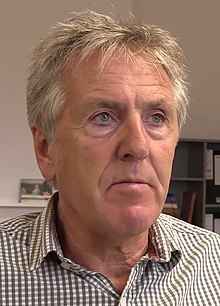
Neil Mercer is Emeritus Professor of Education at the University of Cambridge.
Mercer grew up in Cockermouth in Cumbria, where he went to Cockermouth Grammar School before studying psychology at the University of Manchester. He has a PhD in psycholinguistics from the University of Leicester. His research explores the role of dialogue in education and the development of children's reasoning.
Biography
He is Emeritus Professor of Education at the University of Cambridge, where he is also Director of the study Centre Oracy Cambridge and a Life Fellow of the college Hughes Hall. Prior to moving to the University of Cambridge, he was Director of the Open University's Centre for Research in Education and Educational Technologies (CREET). and a member of the Centre for Language and Communications. He was previously co-editor of the journal Learning, Culture and Social Interaction, editor of the journal Learning and Instruction and the International Journal of Educational Research.
Research
Mercer has emphasised the use of language to "inter-think" and build "common knowledge" – shared understandings and perspectives to work together, particularly in classrooms. From Common Knowledge onwards his work has been explicitly Vygotskian in nature, fitting into a wider sociocultural and dialogic learning focus in education. (See e.g.) However, in contrast to Lev Vygotsky's Zone of Proximal Development, Mercer proposes we consider the 'Intermental Development Zone' – the space that language creates which allows peers to interact and develop their reasoning together, in the absence of a guiding teacher. This work is cited as important in development of understanding of language for learning.
Mercer's key interest is in the quality of talk and its impact on educational outcomes, including talk in the home for example, arguing that "'social interaction and collaborative activity' in class can provide 'valuable opportunities' for learning" and that classroom talk should be oriented around co-operation rather than competitiveness, to encourage exploratory talk rather than disputational where the former focuses on explaining ideas, listening to others, and the building of mutual understanding and the latter on a lack of constructive argument which is characterised by disagreement with little explanation. Research exploring this typology and its third component – cumulative talk, in which ideas are shared but not built upon or critically analysed – has found "evidence of the link between the development of children's communication skills and improvements in their critical thinking.", leading to the suggestion that there should be more focus on these skills in classrooms, and commensurately teacher education programs, including in the context of computer use. This approach has been termed (and researched under the banner of) "Thinking Together". This approach has been used internationally particularly in Mexico (see e.g.) and recently Chile. Mercer's research into the educationally salient components of discourse has been grounded in 'sociocultural discourse analysis' – a theory to which he has contributed. Sociocultural discourse analysis focuses on what language is used to do, and in Mercer's work, how it is used to share meaning, create common knowledge, and interthink.
References
- "The Faculty of Education: Neil Mercer". University of Cambridge. Retrieved 20 June 2019.
- ^ "Faculty of Education, University of Cambridge " Neil Mercer". Educ.cam.ac.uk. Retrieved 28 April 2013.
- Professor Neil Mercer (18 January 2013). "Professor Neil Mercer | The Fellowship | Hughes Hall". Hughes.cam.ac.uk. Archived from the original on 31 January 2013. Retrieved 28 April 2013.
- "Learning, Culture and Social Interaction". Csemails.elsevier.com. Retrieved 27 February 2015.
- "Learning and Instruction :Table of Contents". Elsevier.com. Retrieved 27 February 2015.
- ^ Edwards, Derek, and Neil Mercer. Common Knowledge: The Development of Understanding in the Classroom. London, UK: Routledge, 1987.
- Daniels, Harry. Vygotsky and Research. Routledge, 2008.
- Mercer, Neil. Words & Minds: How We Use Language to Think Together. Oxon: Routledge, 2000.
- Littleton, Karen, and Christine Howe. Educational Dialogues: Understanding and Promoting Productive Interaction. Abingdon, Oxon: Routledge, 2010.
- Garner, Richard (14 December 2007). "The key to your child doing well at school? Conversation in the home – Education News – Education". The Independent. Archived from the original on 18 June 2022. Retrieved 28 April 2013.
- ^ "Study calls for more play and talk | UK | News | Daily Express". Express.co.uk. 14 December 2007. Retrieved 28 April 2013.
- Mercer, Neil, and Karen Littleton. Dialogue and the Development of Children's Thinking: A Sociocultural Approach. New edition. Routledge, 2007
- "Talking is good for the brain;Briefing;Research focus – magazine article". TES. Retrieved 28 April 2013.
- "Teachers branded 'useless' at discussion – News". TES. Retrieved 28 April 2013.
- "My 'useless' attack was more a call to arms". Tes.co.uk\accessdate=2015-02-27.
- "Talking about computers;News – Article". TES. Retrieved 29 April 2013.
- Phil Revell (16 May 2000). "Young citizens | Education | guardian.co.uk". Guardian. Retrieved 29 April 2013.
- "Thinking Together, University of Cambridge". Thinkingtogether.educ.cam.ac.uk. Retrieved 28 April 2013.
- Rojas-Drummond, Sylvia, and Neil Mercer. "Scaffolding the Development of Effective Collaboration and Learning." International Journal of Educational Research 39, no. 1–2 (2003): 99–111. doi:10.1016/S0883-0355(03)00075-2.
- "El Mercurio". Impresa.elmercurio.com. 8 April 2013. Retrieved 28 April 2013.
- ^ Mercer, Neil, and Karen Littleton. Dialogue and the Development of Children's Thinking: A Sociocultural Approach. New edition. Routledge, 2007.